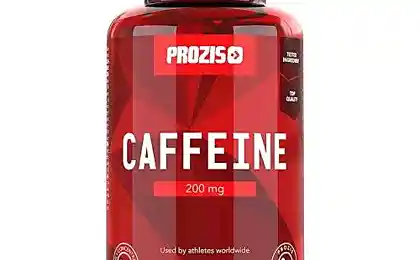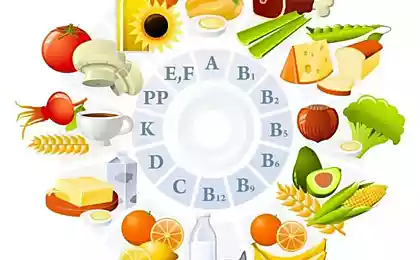792
Still you drink vitamin tablets, capsules or syrups?

Synthetic vitamins are harmful to health
Synthetic multivitamin tablets do not protect from disease and perhaps even increase the risk of developing certain malignancies.
This sensational information is published in the "Lancet»
- The most influential scientific and medical journal in the world.
How to justify the application of scientists?
Drugs with multivitamins in the form of tablets, capsules and syrups, have become part of our lives.
Advertising and promotion have done their job - many start their day with a tablet containing vitamins and minerals.
Some people prefer a multivitamin, registered as medicines, someone takes synthetic dietary supplements - dietary supplements.
The essence of the drugs does not change, filling them about the same.
And this behavior is welcome scientists.
The official position repeatedly expressed by specialists Institute of Nutrition of the Russian Academy of Medical Sciences,
It lies in the fact that our fellow citizens do not have enough vitamins, and they do not need to consume courses 2-3 times a year,
and almost constantly.
In recent years abroad have repeatedly appeared serious scientific research,
that multivitamin use was subjected to serious doubts.
And what is interesting: in Russia, none of these studies did not get much publicity or in the scientific press, no public
. Beta-carotene to vitamin A increases the death rate by 30%,
and vitamin E - 10%
It found scientists who have studied the effect of synthetic multivitamins on the prevention of cancers of the digestive system:
"We could not find evidence that the supplements with antioxidants may prevent the development of cancer of the gastrointestinal tract; on the contrary, they may increase mortality, "- they write in the pages of" The Lancet ".
Worse than others proved effective combination of beta-carotene to vitamin A and E (according to these "vitaminchiki" and gained the main negative in recent years).
Beta-carotene is in the company of vitamin A increased the mortality rate of nearly 30%, and vitamin E - to 10%.
Although these figures are statistically significant, the researchers delicately say they are not sure and use the term "possible".
And once again, they emphasize the need for further research in order to put the record straight i.
But this time scientists had the courage to calculate the potential losses associated with excessive enthusiasm multivitamins.
"If scientists find correct - write in comments to an article in 'The Lancet' David Forman of the University of Leeds and Douglas Altman from the British Society for Research on Cancer (Cancer Research UK),
- Each of the 1 million people who use these drugs, 9,000 people die prematurely. "
The prospect that some synthetic multivitamin not only have side effects,
but also can kill, they are referred to as "frightening suppose».
How was the study
The sensational study was carried out according to the most stringent standards of a group of scientists, members of the "Cochrane collaboration» (Cochrane Collaboration).
This influential international organization dedicated to the revision of clinical drug studies, dietary supplements and various treatments.
For this purpose, a so-called meta-analysis: collect all the research on a certain topic,
selected from those which are made correctly (in science is very much apparent "limes"), summarize their findings and again cheated.
Thanks to this approach, combining a very large number of people, a new and unexpected data may appear.
In this case, scientists have summarized 14 studies conducted earlier, which was attended by more than 170 thousand people.
All studies have been devoted to the study of multivitamins, antioxidants for prevention of malignant diseases of the digestive system
- Cancers of the esophagus, stomach, intestines, pancreas and liver.
Among the antioxidants includes synthetic beta-carotene (a precursor of vitamin A in the body),
vitamin A itself, as well as vitamins C, E and selenium.
These substances are well known and popular - drugs with them very much.
Typically, they are used to protect the body from heart disease, cancer and aging in general.
The logic of such a purpose is clear:
Antioxidants neutralize free radicals, which contribute to the development of these diseases, including aging.
That's the theory, but in practice it turns out somehow anyway.
Zero result in cardiovascular diseases and cancer prevention
A few years ago in "The Lancet" published the results of a very large study Heart Protection Study.
It was attended by more than 20 thousand people with a high risk of cardiovascular disease.
They have studied the protective effects of the same antioxidants - beta-carotene and vitamins C and E.
The result - zero.
During the five-year observation drugs did not hinder the development of heart attacks, stroke and various cancers.
Thus blood levels of the vitamins themselves increased.
But for some reason they did not work.
Despite these data, drugs and synthetic dietary supplements with antioxidants to protect the heart and blood vessels continue to be produced, recorded and publicized.
This happens all over the world.
It is a scandal occurred even earlier, in 1998.
Then, the World Health Organization (WHO) and International Agency for Research on Cancer (the IARC), included in the structure of the organization, made an official warning that,
Synthetic drugs with beta-carotene and substances close to it should not be used to prevent cancer.
That is the conclusion the world's leading scientists have analyzed the results of numerous studies on the prevention of diseases by means of beta-carotene and vitamin A.
Fruits and vegetables.
This group of products is the most important (and almost only) source of vitamins C and P
and contributes significantly to the promotion of human folic acid and beta-carotene,
contain significant amounts of potassium, vitamin B complex, minerals,
dietary fiber and a small amount of fat.
- None of these studies, preparations had no significant preventive effect,
- Then I warned Dr. Harri Vainio, head of one of the IARC offices.
- Moreover, smoking among volunteers receiving drugs were found a higher risk of lung cancer and an increase in mortality from cardiovascular disease.
Our group came to the conclusion that there is more information about how synthetic beta-carotene and other carotenoids influence the processes that lead to cancer,
None of these substances should not be sold to the public as the drugs that prevent the development of tumors.
In the meantime, the prevention of cancer fresh fruits and vegetables is more effective,
than taking one or more of these substances in the form of synthetic dietary supplements.
It has been six years, new data on the adverse effects of beta-carotene and other antioxidants synthesized artificially, but things are there.
Commercial use of such drugs continues.
Serious studies proving their efficacy and safety, the manufacturers do not spend.
Unlike "vitaminchiki" drugs are considered safe and useful a priori.
The whole thing - in molecules
Why is a scientific theory is not borne out in practice?
It looks like the whole thing in chemistry:
antioxidants consisting of vegetables and fruit are working, and the same substance from the tube - not.
Biochemists are well known such cases, when the "living" molecules behave differently than their synthetic counterparts.
it is often associated with isomerism - a phenomenon in which the same molecules have a different arrangement of atoms in space.
Here we can recall the so-called trans fats, which behave differently than natural fats with the same molecular composition.
Flavor enhancer or sodium glutamate is widely used in the food industry.
It also exists in the form of two isomers: living glutamate from natural sources is different from the synthetic.
In addition, live vitamins are always "contaminated" weight accompanying substances in fruits and vegetables, which often play a useful role.
A pure chemical vitamins lack these properties.
Be that as it may, the research in these areas can present to us in the coming years, a lot of surprises. And not all of them are pleasant.
Alexander Melnik, PhD























